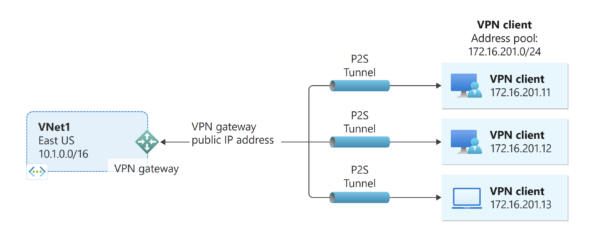Understanding VPN Gateway
A VPN (Virtual Private Network) Gateway serves as a key component in establishing secure connections between remote users or networks and a private network, typically over the internet. It acts as an entry point that encapsulates and encrypts data traffic, ensuring confidentiality, integrity, and authenticity of transmitted information.
Detailed Insight into VPN Gateway
VPN Gateways are deployed to facilitate secure communication over untrusted networks like the internet. They operate by creating encrypted tunnels through which data passes, shielding it from unauthorized access or interception. These gateways utilize various encryption protocols such as IPsec (Internet Protocol Security), SSL/TLS (Secure Sockets Layer/Transport Layer Security), or OpenVPN to secure data transmission.
Key Features of VPN Gateway
- Encryption: Encrypts data traffic to prevent eavesdropping and tampering.
- Authentication: Validates the identity of users or devices accessing the network.
- Access Control: Controls access to resources based on user credentials and policies.
- Scalability: Supports a large number of concurrent connections and network endpoints.
- High Availability: Ensures continuous operation through redundancy and failover mechanisms.
- Logging and Auditing: Records and monitors network activity for security and compliance purposes.
Types of VPN Gateway
There are several types of VPN Gateways tailored to specific deployment scenarios and requirements:
| Type | Description |
|---|---|
| Site-to-Site VPN | Connects multiple remote sites or branch offices securely over the internet, creating a virtual private network. |
| Remote Access VPN | Allows individual users to securely access the private network from remote locations, such as home or travel. |
| Client-to-Site VPN | Similar to remote access VPN but specifically designed for connecting individual clients to a corporate network. |
| Cloud VPN Gateway | Hosted VPN gateways provided by cloud service providers, offering scalable and cost-effective connectivity. |
| Software VPN Gateway | VPN gateways implemented as software applications, suitable for virtualized or software-defined environments. |
Utilizing VPN Gateway
VPN Gateways find numerous applications across various industries and use cases:
- Secure Remote Access: Facilitates remote work by enabling employees to securely access corporate resources from anywhere.
- Branch Office Connectivity: Connects branch offices or remote sites to a central network, fostering collaboration and data sharing.
- Cloud Connectivity: Extends private network infrastructure to cloud environments, enabling seamless integration and hybrid cloud deployments.
- Cross-border Data Transfer: Ensures secure transmission of sensitive data across international borders, complying with data privacy regulations.
Challenges and Solutions
Despite their benefits, VPN Gateways may encounter challenges such as:
- Performance Overhead: Encryption and decryption processes can introduce latency and reduce network throughput.
- Compatibility Issues: Interoperability problems may arise when connecting with legacy systems or disparate network environments.
- Security Vulnerabilities: Exploits targeting VPN protocols or implementation flaws may pose security risks.
These challenges can be mitigated through:
- Optimized Configuration: Tuning encryption parameters and implementing hardware acceleration to improve performance.
- Standardization and Interoperability: Adhering to industry standards and ensuring compatibility with diverse networking equipment.
- Regular Security Audits: Conducting periodic security assessments and applying patches or updates to address vulnerabilities.
Characteristics and Comparisons
| Aspect | VPN Gateway | Firewall |
|---|---|---|
| Purpose | Securing data transmission over untrusted networks | Controlling network traffic based on predefined rules |
| Encryption | Encrypts data traffic to ensure confidentiality | Does not typically encrypt data but may inspect packets |
| Access Control | Controls access to resources based on user credentials | Filters and permits/denies traffic based on rules |
| Traffic Inspection | Does not inspect packet contents unless explicitly configured | Can inspect packet contents for security purposes |
| Deployment | Deployed to create secure network connections | Deployed to protect network perimeters and segments |
Future Perspectives
The future of VPN Gateways involves advancements in technologies such as:
- Zero Trust Network Access (ZTNA): Moving beyond traditional VPNs towards a model where access is based on identity and contextual factors rather than network location.
- Software-defined Networking (SDN): Leveraging programmable network infrastructure to dynamically provision and manage VPN connections.
- AI-driven Security: Incorporating machine learning and artificial intelligence to detect and respond to security threats in real-time.
VPN and VPN Gateway Integration
VPN Gateways work in tandem with VPN clients to establish secure connections. VPN clients initiate the connection to the gateway, which then authenticates and encrypts the data traffic.
Additional Resources
For further information on VPN Gateways, refer to the following resources:
- NIST Special Publication 800-77: Guide to IPsec VPNs
- IETF RFC 4026: Provider-Provisioned Virtual Private Network (VPN) Terminology
- Cisco VPN Solutions Center
This comprehensive guide provides insights into the functionality, deployment, and future trends of VPN Gateways, empowering organizations to make informed decisions regarding their network security infrastructure.


